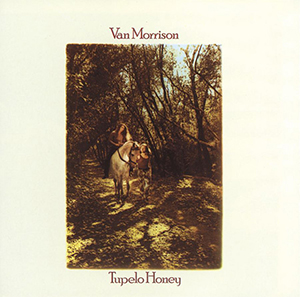
Tupelo Honey is the fifth studio album by Northern Irish singer-songwriter Van Morrison. It was released in October 1971 by Warner Bros. Records. Morrison had written all of the songs on the album in Woodstock, New York, before his move to Marin County, California, except for "You're My Woman", which he wrote during the recording sessions. Recording began at the beginning of the second quarter of 1971 at Wally Heider Studios in San Francisco. Morrison moved to the Columbia Studios in May 1971 to complete the album.

His Band and the Street Choir is the fourth studio album by Northern Irish singer-songwriter Van Morrison. It was released in November 1970 by Warner Bros. Records. Originally titled Virgo's Fool, Street Choir was renamed by Warner Bros. without Morrison's consent. Recording began in early 1970 with a demo session in a small church in Woodstock, New York. Morrison booked the A&R Studios on 46th Street in New York City in the second quarter of 1970 to produce two sessions of songs that were released on His Band and the Street Choir.
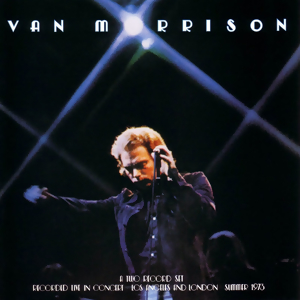
It's Too Late to Stop Now is a 1974 live double album by Northern Irish singer-songwriter Van Morrison. It features performances that were recorded in concerts at the Troubadour in Los Angeles, California, the Santa Monica Civic Auditorium, and the Rainbow in London, during Morrison's three-month tour with his eleven-piece band, the Caledonia Soul Orchestra, from May to July 1973. Frequently named as one of the best live albums ever, It's Too Late to Stop Now was recorded during what has often been said to be the singer's greatest phase as a live performer.

A Period of Transition is the ninth studio album by Northern Irish singer-songwriter Van Morrison, released in 1977. It was his first album in two-and-a-half years. At the time of its release it was received with some disappointment by critics and fans: "Most were hoping for a work of primeval vocal aggression that would challenge the emerging élite of Morrison pretenders, whose ranks included Bruce Springsteen, Bob Seger, Phil Lynott, Graham Parker and Elvis Costello." However, the album is still notable for several major compositions, including "Heavy Connection", "Flamingos Fly", "The Eternal Kansas City" and "Cold Wind in August".
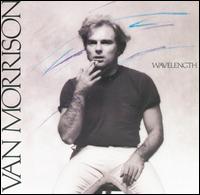
Wavelength is the tenth studio album by Northern Irish singer-songwriter Van Morrison, and was released in the autumn of 1978. The album has a different musical sound from his previous albums, leaning towards a pop rock sound with prominent electric guitars and synthesizers. Wavelength was Morrison's best selling album at the time of the original release. Mick Glossop, Bobby Tench and Peter Bardens were given credit for special assistance in production.
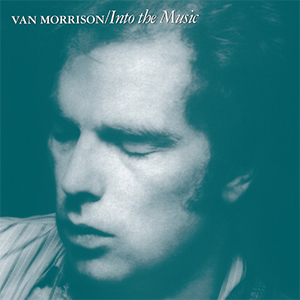
Into the Music is the 11th studio album by Northern Irish singer-songwriter Van Morrison, and was released in August 1979. It includes "Bright Side of the Road", which peaked at number 63 on the UK Singles Chart, and other songs in which Morrison sought to return to his more profound and transcendent style after the pop-oriented Wavelength. The record received favourable reviews from several music critics and was named as one of the year's best albums in the Pazz & Jop critics' poll.

Beautiful Vision is the thirteenth studio album by Northern Irish singer-songwriter Van Morrison, released in February 1982. It continued Morrison's departure from R&B at the time, instead favoring Celtic folk and American jazz in its music. As with many of Morrison's recordings, spirituality is a major theme and some of the songs are based on the teachings of Alice Bailey. Other songs show Morrison's Celtic heritage and reminiscence of his Belfast background.

Poetic Champions Compose is the seventeenth studio album by Northern Irish singer-songwriter Van Morrison, released in 1987 on Mercury Records. It received generally positive reviews from critics, most of whom viewed it as adequate mood music.
The Caledonia Soul Orchestra was the band created by Northern Irish singer-songwriter Van Morrison in 1973. The band was named after an eighteen-minute instrumental outtake on the His Band and the Street Choir album.

"Moondance" is a song recorded by Northern Irish singer and songwriter Van Morrison and is the title song on his third studio album Moondance (1970). It was written by Morrison, and produced by Morrison and Lewis Merenstein.

"Domino" is a hit song written by Northern Irish singer-songwriter Van Morrison. It is the opening track of his fourth studio album, His Band and the Street Choir. This song is Morrison's personal musical tribute to New Orleans R&B singer and pianist Fats Domino.

"Warm Love" is a hit song written by Northern Irish singer-songwriter Van Morrison.
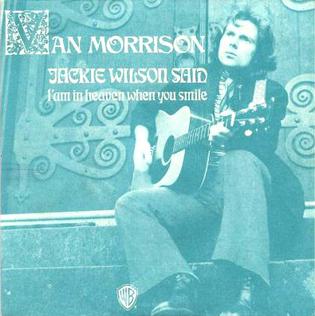
"Jackie Wilson Said (I'm in Heaven When You Smile)" is a song written and performed by Van Morrison and featured as the opening track on his sixth studio album, Saint Dominic's Preview. It was released by Warner Bros. in July 1972 as the first of three singles from the album and charted at number sixty-one on the US Billboard Hot 100. Both the music and lyrics are inspired by rhythm and blues singer Jackie Wilson and his song "Reet Petite", which is directly quoted in the song.

Keep It Simple is the thirty-third album by Northern Irish singer/songwriter Van Morrison, released in March 2008. It was Morrison's first US Top 10 album, and made the Top 10 in the UK, Canada and in some European countries. It was his first studio album of all new original material since Back on Top (1999), and includes elements of jazz, folk, blues, celtic, country, soul and gospel.
"Moonshine Whiskey" is a song written by singer-songwriter Van Morrison and is the concluding track of his 1971 album Tupelo Honey.
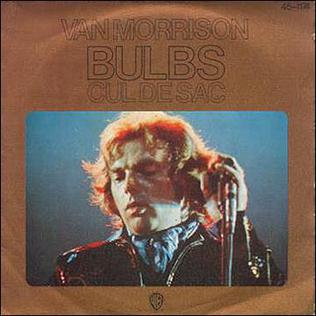
"Bulbs" is a song written by Northern Irish singer-songwriter Van Morrison. It was the only single to be taken from his 1974 album Veedon Fleece, with a B-side of "Cul de Sac" for the US release and "Who Was That Masked Man" for the UK release.
"I Will Be There" is a song featured on Northern Irish singer/songwriter Van Morrison's sixth album Saint Dominic's Preview (1972). The song is also the B-side to Morrison's single "Warm Love", released in 1973.
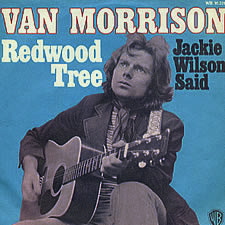
"Redwood Tree" is the sixth song on Northern Irish singer-songwriter Van Morrison's 1972 album, Saint Dominic's Preview, released in July 1972 by Warner Bros. It was later released in October as the second of three singles from the album and charted at number 98 on the US Billboard Hot 100.

"Ivory Tower" is a song written by Northern Irish singer-songwriter Van Morrison and included on his 1986 album, No Guru, No Method, No Teacher. The song was also released as a single with the B-side "A New Kind of Man", from his previous album A Sense of Wonder. It charted at No. 21 on the US Mainstream Rock Tracks in 1986.

"Cul de Sac" is a song written by Irish singer-songwriter Van Morrison. It first appeared as the seventh track on Morrison's 1974 album Veedon Fleece, and was released as the B-side to the single "Bulbs".















